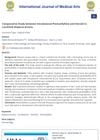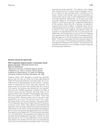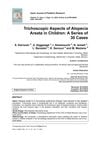 60 citations,
June 1997 in “Journal of The American Academy of Dermatology”
60 citations,
June 1997 in “Journal of The American Academy of Dermatology” Apoptosis is crucial for healthy skin and treating skin diseases.

The patient with total hair loss did not regrow hair despite treatment, indicating a poor outlook for this type of hair loss.
36 citations,
January 2010 in “International Journal of Trichology” Intralesional steroids can help regrow hair in some alopecia areata patients but have side effects.
 49 citations,
July 2009 in “Journal of the American Academy of Dermatology”
49 citations,
July 2009 in “Journal of the American Academy of Dermatology” Some people experienced hair loss after mesotherapy treatments for hair loss.
 October 2024 in “International Journal of Medical Arts”
October 2024 in “International Journal of Medical Arts” Corticosteroids regrow hair better and faster than pentoxifylline for alopecia areata.
 1 citations,
March 2020 in “Australasian Journal of Dermatology”
1 citations,
March 2020 in “Australasian Journal of Dermatology” The paper concludes that recognizing bitemporal alopecia areata is important for early treatment and preventing its progression.
 July 2018 in “Elsevier eBooks”
July 2018 in “Elsevier eBooks” New hair loss treatments show promise, but more research is needed to confirm their effectiveness.
 June 2023 in “British journal of dermatology/British journal of dermatology, Supplement”
June 2023 in “British journal of dermatology/British journal of dermatology, Supplement” Congenital alopecia areata may have genetic links and topical corticosteroids are an effective treatment.
 5 citations,
November 2008 in “Advances in Dermatology”
5 citations,
November 2008 in “Advances in Dermatology” The review highlights the importance of stem cells in hair health and suggests new treatment strategies for hair loss conditions.
 80 citations,
October 1983 in “BMJ”
80 citations,
October 1983 in “BMJ” Minoxidil helps hair regrowth in alopecia patients, with 16 having good results and no side effects.
 66 citations,
July 2003 in “International Journal of Dermatology”
66 citations,
July 2003 in “International Journal of Dermatology” Betamethasone valerate foam is more effective and safe for treating mild-to-moderate alopecia areata than betamethasone dipropionate lotion.
 20 citations,
February 1985 in “Archives of Dermatology”
20 citations,
February 1985 in “Archives of Dermatology” Minoxidil helps hair regrowth, especially with more indeterminate hairs.
 89 citations,
October 1996 in “Dermatologic Clinics”
89 citations,
October 1996 in “Dermatologic Clinics” Alopecia areata is likely caused by a combination of genetic factors and immune system dysfunction, and may represent different diseases with various causes.
65 citations,
September 1999 in “The Journal of Dermatology” Twice-weekly 5 mg dexamethasone can effectively treat extensive alopecia areata in many patients.
 January 2016 in “Springer eBooks”
January 2016 in “Springer eBooks” Cryotherapy may be an effective and simple treatment for mild hair loss with few side effects.
25 citations,
March 2017 in “International Journal of Dermatology” Ruxolitinib effectively and safely regrows hair in alopecia patients.
 9 citations,
January 2016 in “Journal of cosmetology & trichology”
9 citations,
January 2016 in “Journal of cosmetology & trichology” Fractional laser treatment helped hair regrowth in patients with alopecia areata.
 13 citations,
February 2015 in “Actas Dermo-Sifiliográficas”
13 citations,
February 2015 in “Actas Dermo-Sifiliográficas” The document concludes that recognizing specific histological features of different nonscarring alopecias is crucial for accurate diagnosis and understanding hair loss progression.
 16 citations,
February 2018 in “Journal of Cosmetic Dermatology”
16 citations,
February 2018 in “Journal of Cosmetic Dermatology” Carboxytherapy may help increase hair growth in alopecia patients but requires ongoing treatment.
20 citations,
November 2017 in “JAAD case reports” Ustekinumab significantly improved psoriasis, vitiligo, and alopecia areata in a patient.
 1 citations,
December 2022 in “Journal of cosmetic dermatology”
1 citations,
December 2022 in “Journal of cosmetic dermatology” The combination of vitamin D analogues with potent steroids is a favorable treatment for alopecia areata with fewer side effects.
4 citations,
March 2022 in “Journal of cosmetic dermatology” The mixed preparation helped hair regrowth but wasn't better than minoxidil.
30 citations,
August 1998 in “International Journal of Dermatology” Systemic corticosteroids don't prevent severe alopecia areata from spreading or relapsing.
 47 citations,
June 2014 in “Journal of Dermatological Treatment”
47 citations,
June 2014 in “Journal of Dermatological Treatment” Most treatments for lichen planopilaris were found to be generally unsatisfactory.
 2 citations,
February 2014 in “Hair therapy & transplantation”
2 citations,
February 2014 in “Hair therapy & transplantation” Alopecia Areata is an autoimmune condition causing hair loss, influenced by genetics, environment, and possibly improved by anti-MIF therapy, with many patients experiencing regrowth within a year.
40 citations,
September 2019 in “World journal of clinical cases” An elderly man's hair grew back after a treatment that transferred healthy gut bacteria.
March 2016 in “Actas dermo-sifiliográficas/Actas dermo-sifiliográficas” Stopping the use of a tight headband and using specific treatments led to partial hair regrowth.
9 citations,
July 2010 in “Pediatric dermatology” Corticosteroids worked better than anthralin cream for hair regrowth.
March 2023 in “Medica Hospitalia: Journal of Clinical Medicine” PRP is a safe and effective treatment for hair growth in alopecia areata.
 January 2023 in “Asian Journal of Pediatric Research”
January 2023 in “Asian Journal of Pediatric Research” Trichoscopy is crucial for diagnosing and assessing alopecia areata in children.




















